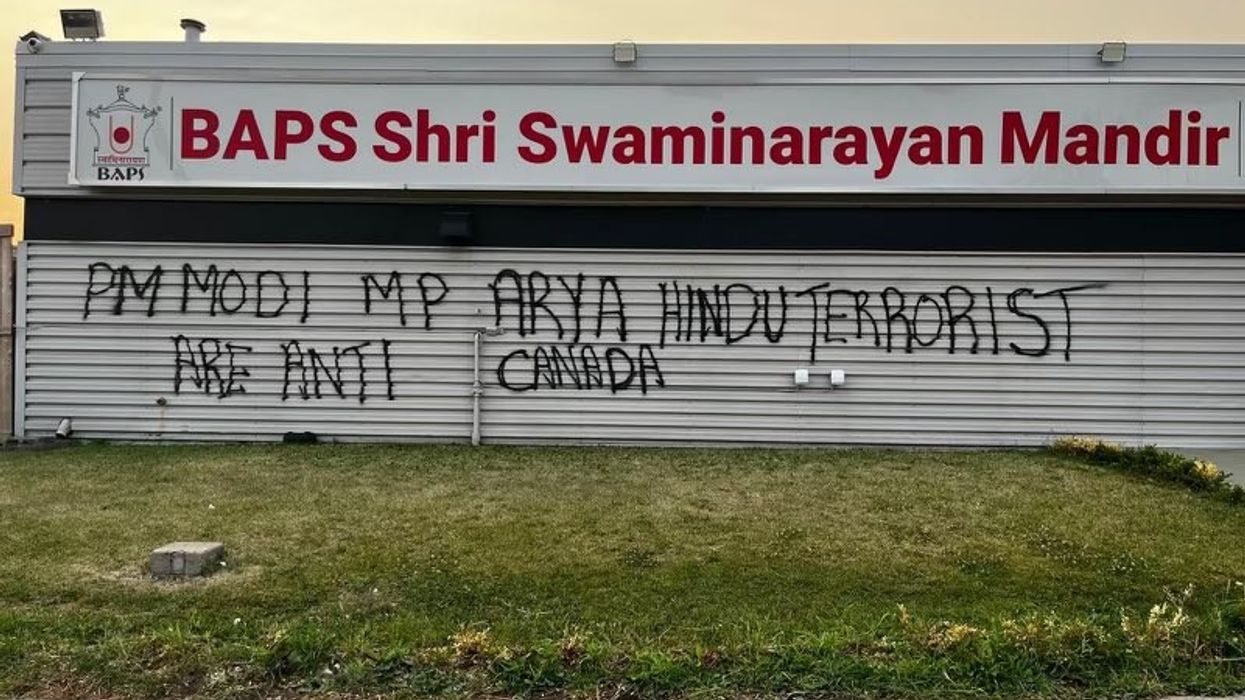A BAPS Swaminarayan Temple in Edmonton, Canada, has been vandalised with anti-India graffiti.
The Consulate General of India in Vancouver condemned the act, stating, “We condemn the defacing of BAPS Shri Swaminarayan Mandir in #Edmonton with anti-India graffiti. We have requested the Canadian authorities to investigate the incident and take prompt action against the perpetrators.”
The BAPS organisation, which operates the temple, has not yet commented on the incident. There are no reports of official actions regarding the vandalism that occurred on Monday morning.
Randy Boissonnault, member of parliament for Edmonton Centre, said, “Earlier today, the Edmonton BAPS Mandir was vandalised with paint, displaying hateful rhetoric on the walls of what should be a place of refuge. Hate has no part in Canada—much less in places of worship & prayer. This incident is wrong & goes against the values of our city.”
The Canadian Hindu Chamber of Commerce (CHCC) also responded, calling the vandalism an attack on both the physical structure and the sentiments of the Hindu community. They condemned the “senseless act of hate” and the “rising tide of Hinduphobia” across Canada, urging the government and local authorities to take immediate and effective measures against such acts.
The CHCC emphasised the need for a united effort to combat Hinduphobia and protect religious institutions. They noted previous incidents last year involving attacks on Hindu temples in Mississauga, Brampton, and Windsor, some featuring Khalistani referendum posters.
The latest vandalism in Edmonton has provoked strong reactions, including from elected officials. Chandra Arya, MP from Nepean, noted, “During the last few years, Hindu temples in the Greater Toronto Area, British Columbia and other places in Canada are being vandalised with hateful graffiti. Gurpatwant Singh Pannun of Sikhs for Justice last year publicly called for Hindus to go back to India.”
Arya added, “Khalistan supporters publicly celebrated in Brampton and Vancouver the assassination of prime minister Indira Gandhi and brandishing images of deadly weapons,” and called for Canadian law enforcement to address the issue seriously.
Terry Duguid, MP from Winnipeg South and parliamentary secretary to prime minister Justin Trudeau, expressed his sadness, stating, “I am deeply saddened to learn that the BAPS Shri Swaminarayan Mandir in Edmonton was vandalised today. Defacing a place of worship is a repulsive act that goes against Canadian values of tolerance and respect. This act of hate is completely unacceptable.”
The Hindu American Foundation also condemned the act, noting that the BAPS temple in Edmonton was defaced with slurs threatening Arya. They urged Canadian authorities to investigate the vandalism and remain vigilant, especially with the upcoming ‘Khalistan referendum’ in Calgary sponsored by Sikhs for Justice.
(With inputs from PTI)





